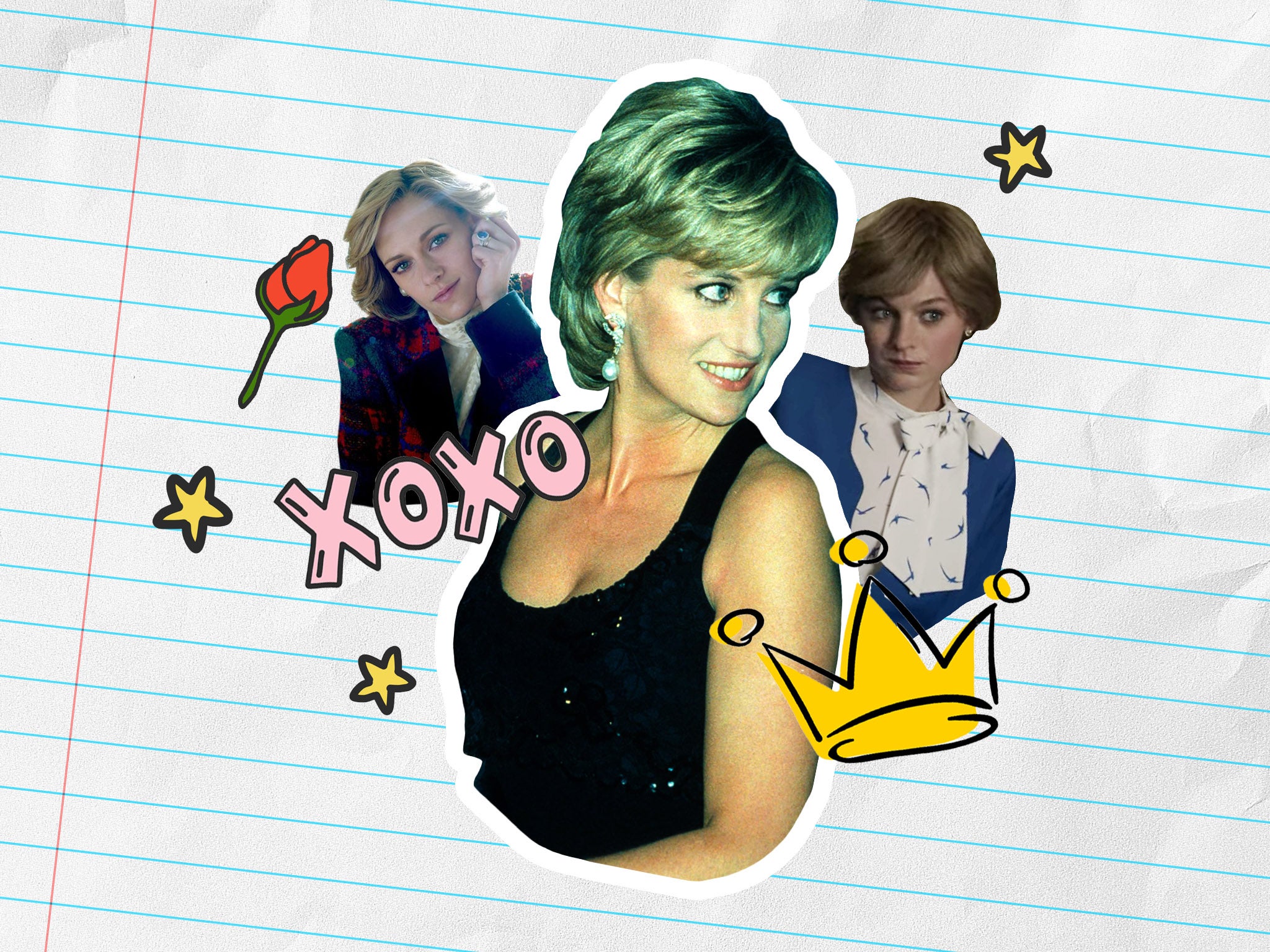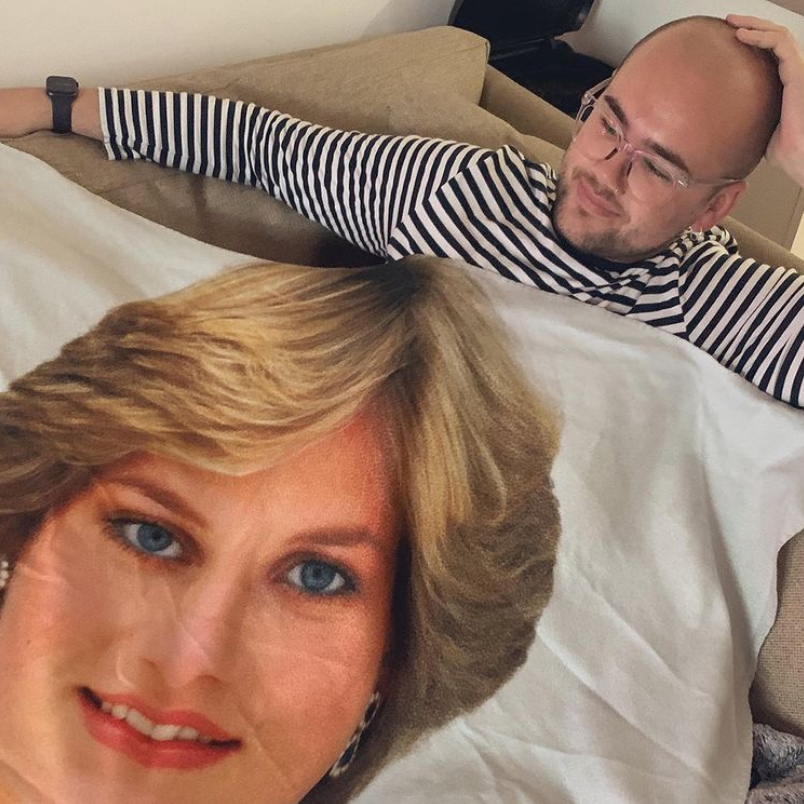How Spencer, The Crown and the internet turned Princess Diana into a Gen-Z queen
As Kristen Stewart becomes the latest cool, queer and meme-friendly actor to play Diana in a dramatisation of her life, Adam England explores how young people who weren’t even born in the late royal’s lifetime have come to see her as a pop culture hero


Timeline dead?” asked one viral tweet in September. “Here’s a reminder that this trailer exists.” “Yeah her Oscar coming for real,” read another. “Wishing y’all a very happy ‘watch this trailer at least five times today’ day,” read one more. You might expect to see those kinds of tweets after a trailer drops for a Netflix movie, maybe one set in a high school, or perhaps starring a Gen-Z icon such as Zendaya. Not, as they were, in relation to Spencer, a historical drama about British royalty.
To make that assumption, however, would be to ignore the soaring popularity – almost 25 years after her death – of the woman at the centre of the film: Princess Diana. When the first full-length trailer for Spencer was released in September, the excitement from young people across social media was palpable. Starring Kristen Stewart as the late princess, the forthcoming drama is set over a weekend in 1991, with Diana planning to end her marriage to Prince Charles.
Stewart has long been a teen favourite thanks to the Twilight movies, but anticipation over the movie stemmed just as much from the people’s princess as it did from her. Despite the majority of Gen-Z – defined loosely as those born from around 1997 to the early 2010s – not yet even having been conceived when Diana died in a Paris car crash in September 1997, the late royal is enjoying an explosion in popularity with young adults.
Myriad Facebook groups have been set up in her honour, with young people congregating to sing her praises, affectionately dub her “Ar Di” in the way a grandparent might refer to a family member and share a good helping of memes, too. The most prominent group is “Princess Diana – Keep Her Memory Alive (NO TROLLS ALLOWED)”, which has almost 45,000 members, most of them in on the joke. A trawl through the group will see posts of the sentimental variety – which we might associate with more traditional royalists – intertwined with the satirical and the absurd. There will be images of random celebrities – think Denise Welch or one-time X Factor contestant Eoghan Quigg – posted with the pretence of them depicting Diana herself, or baffling charity shop finds and forgotten attic treasures commemorating her marriage.
Essentially, the posts mimic “boomerspeak”, or the way that baby boomers – defined as those born between the mid-1940s and the mid-1960s – are perceived to communicate online, combined with the often nonsensical and deliberately ironic memes so beloved of Gen-Z. Of course, each post comes served with a dose of love, too – it’s just expressed in a roundabout way that may not be obvious to outsiders. Some of those people also happen to be in these groups as well: unsuspecting royalists who often don’t quite get the affectionate humour from younger Diana fans. Such contrasting expressions can invite humorous misunderstandings, which then typically get screenshotted and repurposed on other social media platforms.
Almost parallel to the rise of contemporary Diana fandom have been fictionalised portrayals of the princess in film and television. The Netflix series The Crown has been a runaway success, with Emma Corrin earning plaudits for her performance as Diana in its fourth season, which was released a year ago. It spawned a number of memes: most notably, a moment in the third episode of the season in which Prince Charles, played by Josh O’Connor, proposes to Diana, and the camera closes in on Corrin’s smiling face, her eyes darting left and right. It proved to be perfect meme material, the original clip receiving more than 2.5 million views in one day when it was published on Twitter.
It wasn’t the first instance of digital culture and Diana fandom colliding. In 2017, a Twitter user called @Deno_Tron went viral when he fashioned a Princess Diana shrine in his roommate’s bedroom, just as he was about to return with a date. An image of said shrine – complete with candles, pictures of Diana and a collage with images of the roommate and the princess above a caption reading: “Lovers separated by time and circumstance” – proved a hit with the Twittersphere and, from there, such an approach to the princess’s memory seemed to evolve into the Di-hard fandom we know today. This has happened via the spread of sincere if odd proclamations of Diana-love, which originate on niche Facebook groups before landing on Twitter, Reddit or sites solely devoted to memes. One that is often shared and reshared is a post featuring pictures of a Diana commemorative plate decorated in food, with the late princess appearing to sport a mashed potato hairdo and tomato earrings. “I like to use my Princess Diana plate but I never cover her beautiful face xx,” reads the accompanying caption.
It’s become a real – if unlikely – community. But is it all purely ironic? Or is it true love? For Jordan Taylor-O’Neill, a 23-year-old Diana fan, it’s a bit of both. “My love and respect for Diana is absolutely real, but the way I express that is very tongue-in-cheek,” she says. “I’ve always had respect for her, but it’s become more exaggerated as the memes have become more common and people have learned more about her life as a result.”
“Although the ‘Ar Di’ memes may seem insensitive or rude to some die-hard royal fanatics, it’s not something to be knocked,” believes fellow Diana fan and group member Bethan McConnell. “If you’re seeing ‘Ar Di’ on your newsfeed every couple of days, it’s proving that people are still bothered about her. You will get the odd member who’s a die-hard royalist and sees the whole thing as disrespectful, but I think that’s the point.”

Watch Apple TV+ free for 7 day
New subscribers only. £9.99/mo. after free trial. Plan auto-renews until cancelled.
ADVERTISEMENT. If you sign up to this service we will earn commission. This revenue helps to fund journalism across The Independent.

Watch Apple TV+ free for 7 day
New subscribers only. £9.99/mo. after free trial. Plan auto-renews until cancelled.
ADVERTISEMENT. If you sign up to this service we will earn commission. This revenue helps to fund journalism across The Independent.
“People are essentially making fun of the older people who post dramatic, three-page tributes whenever the Queen has a birthday, or how much they love watching [her] speech on Christmas Day,” she continues. “I don’t think that this sort of thing is much different, except this is more fun. As the group’s title states: ‘Keep her memory alive’.”
This affectionate mockery, very much a form of love, is “a take on how everyone’s mum loves ‘Ar Di’,” thinks 24-year-old Harry Jones. “The national outpouring of grief when she died speaks for itself. People felt like they knew her. And so I think Gen-Z look at that and see it as an extension of taking the piss out of the older generation.”

But for all of the tongue-in-cheek humour surrounding the late princess, is it rooted in something more serious as well? Young people in the UK are overwhelmingly left-leaning (more than half of under-thirties voted for Labour in 2019, with just over a fifth plumping for the Tories), and while Diana was hardly Che Guevara, her legacy has almost become a cause celebre for progressive young Brits who see her – as well as Prince Harry and Meghan Markle – in a different light to the rest of the royal family. Their love for Diana is a way of expressing their disillusionment with the powers that be.
“She was a familiar face in an establishment that so many of us can’t relate to,” Jordan says. “She championed causes our generation cares about at a time where it wasn’t as acceptable. She broke traditions and she looked good doing it; she was the closest real-life example of the Disney princesses we grew up idolising.”
Part of the relatability – and her anti-establishment nature – was Diana’s commitment to LGBTQ+ rights, at a time when it was far less acceptable to be a real ally. “The [LGBTQ+] community gravitate towards strong, non-conformist women,” Harry says. “Diana’s work supporting people living with HIV-Aids was also huge for the time. The stigma surrounding it in the Nineties devastated the community so seeing a member of the royals go into a hospital and hug patients with HIV-Aids was groundbreaking. There’s still so much work to be done on the stigma but I like to think Diana really helped to challenge it at the time.” There is also the famous anecdote about Freddie Mercury once smuggling Diana into a gay bar in disguise, and it’s perhaps safe to assume that she would approve of being portrayed by prominent queer actors such as Stewart and Corrin. Both performances only further cement the princess as a queer icon herself.
They also drive home the fact that people can mould their view of Diana however they like. In death, Diana hasn’t just become a queer icon, but a royal revolutionary, an Instagram-friendly style inspiration and figure of almost universal admiration. “Loving Princess Diana is one of the few opinions most of Britain share,” Jordan says. “The exaggerated way [Gen-Z] speak about her is satire, a way to copy how royalists speak about the rest of the royal family, but that doesn’t make our love for Diana any less genuine.”
‘Spencer’ is in cinemas from 5 November
Join our commenting forum
Join thought-provoking conversations, follow other Independent readers and see their replies
Comments


Bookmark popover
Removed from bookmarks